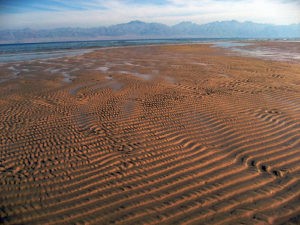This is the eighth part in The Stutterer, a fiction series by the author. Installments run on Sunday mornings. You can find the first seven parts here.
Gnats seethed into the city and nested in the eyes and ears of all its inhabitants, wild beasts and pestilence destroyed the livestock, boils and rashes destroyed skin; fire and hail rained down from a sky about to be darkened, first by millions of locusts that blotted out the sun, followed by a divine darkness that sent shivers through the city and spiraled the people into a deep despair—yet Pharaoh would not relent. Just like when they were kids Rameses still refused to admit defeat, yet he was against someone who couldn’t lose, who had invented the rules of the game; so Moses wasn’t surprised when God told him what would come next. He had actually been waiting for it, so terrible that he couldn’t think about it, yet something he knew must happen to convince Rameses of the stakes.
“Tell every Israelite household to sacrifice a lamb in my name, and wipe its blood upon their door,” God said.
Those that didn’t have a lamb were urged to ask their neighbors, and neighbors were urged to share. Moses told them the how and the when, but could not bring himself to explain the why; yet he stressed the importance of the task. It was the final act of commitment they must show to God, he said, and then they would be free.
The people naturally were hesitant. What could possibly be bad enough to change the Pharaoh’s mind, they asked. What if it still didn’t work? They were being asked to sacrifice a holy Egyptian animal—200,000 of them in total—and advertise the deed in bold upon on their doors.
“That is precisely why it must be done,” was all Moses said.
At dusk a great cry rang out from the Israelite villages as thousands of lambs paid the price of freedom, and at midnight another cry—piercing, vicious and heart breaking—sprang from the Egyptian city. The screams lasted throughout the night as the lion sat alone in his room. He had finally returned to cast the Egyptian bodies into a sea of tears.
Moses was summoned to Pharaoh’s court. He arrived to see Rameses bent over his throne, unable to look up.
“Go,” was all he said.
Moses rushed back to the village. Eighteen minutes later the entire town was streaming out of the city, anxious to leave and afraid to stay. They walked all day and night until someone who had talked to someone who had went back to check on the city said that Rameses had changed his mind and was gathering his Army for war. Chatter started to build—the bold ones even approached Moses. “Rameses is on his way,” they said. “There are too many of us, we’ll never make it.”
“Put your faith in God,” Moses replied. He knew that answer was cryptic, and that just by asking those questions they had shown that they had lost their faith in God—or never had it to begin with—but he was afraid to say anything more lest he show his own doubts. Those near the front could hear him muttering to himself. Questions like, “Where are we going?” or, “Are you still there?” only fueled the rumors that Moses was a crackpot unfit to lead.
Pharaoh had indeed changed his mind. After anguish comes anger, and Egyptian anger had for so long been directed toward the people of Israel that it seemed Pharaoh had forgotten how to be angry with anyone else. Plus his people, the Egyptians, wanted answers, and justice. So Pharaoh gathered every able-bodied man left—he lost half his Army to the tragedy, as well as half his horses, for Moses’s God spared no living thing—and gave chase to the Israelites.
The rumor turned into fact when the Israelites felt the earth shake. Some collapsed from weak legs unable to handle the quaking ground; others collapsed from the pressure and anxiety of being prey. At least in Egypt they weren’t running. The ones in the back started to push against those in front of them, and the orderly progression of people turned into a testy mob. Moses tried to calm them down, tried to tell them that God would see them through this, but he had all he could handle just trying to stay ahead of the group; sheep can be pushed and prodded forever, but they need someone to show them where they’re going. The faster Moses ran to keep ahead of the group, the faster those in front ran to stay at his side.
The footsteps behind them grew louder, and the mountains in front of them grew taller, until Moses looked up and that blue line of sea that in Egypt had seemed so small and abstract had become a large barrier, keeping his people in no man’s land, unable to go forward but unwilling to go back. As the Israelites congealed on the beach, they looked out at the blue, then to Moses, then behind them as the Egyptian chariots became gold specks at the place where land meets sky. Some began to cry, some dove into the sea, Moses wanted to do both; but he gripped his staff until his hand turned red, and with the other he took hold of Aaron’s arm, and the two of them, brothers together, waited for what was next.
(Photo: vigour)


